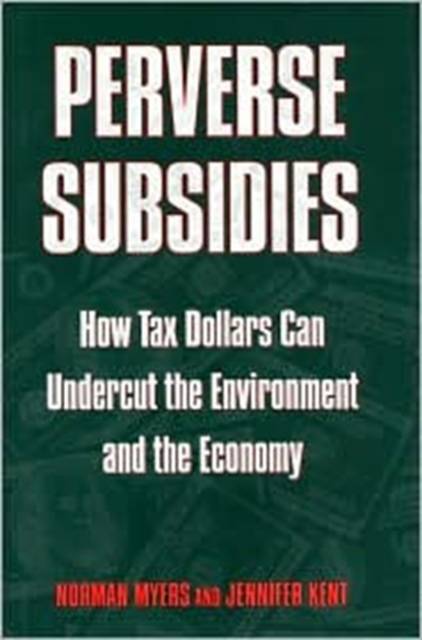
- Afhalen na 1 uur in een winkel met voorraad
- Gratis thuislevering in België vanaf € 30
- Ruim aanbod met 7 miljoen producten
- Afhalen na 1 uur in een winkel met voorraad
- Gratis thuislevering in België vanaf € 30
- Ruim aanbod met 7 miljoen producten
Zoeken
Perverse Subsidies
How Misused Tax Dollars Harm the Environment and the Economy
Norman Myers, Jennifer Kent
Paperback | Engels
€ 32,45
+ 64 punten
Omschrijving
Much of the global economy depends upon large-scale government intervention in the form of subsidies, both direct and indirect, to support specific industries or economic sectors. Distressingly, many of these subsidies can be characterized as "perverse" -- rather than helping society achieve a desired goal, they work in the opposite direction, causing damage to both our economies and our environments. Worldwide subsidies have long been thought to total $2 trillion per year, but until now, no attempt has been made to determine what proportion of that actually subverts the public interest.In "Perverse Subsidies," leading environmental analyst Norman Myers takes a detailed look at the subject, offering a comprehensive view of subsidies worldwide with a particular focus on the extent, causes, and consequences of perverse subsidies. He defines many different kinds of subsidies, from tax incentives to government handouts, and considers their wide-ranging impacts, as he: examines the role of subsidies in policymaking quantifies the direct costs of perverse subsidies examines the major subsidies in agriculture, energy, road transportation, water, fisheries, and forestry considers the environmental effects of those subsidies offers policy advice and specific recommendations for eliminating harmful subsidies .The book provides a valuable framework for evaluation of perverse subsidies, and offers a dramatic illustration of the scale and dimensions of the problem. It will be the standard reference on those subsidies for government reform advocates, policy analysts, and environmentalists, as well as for scholars and students interested in the interactions between policymaking and environmentalissues.
Specificaties
Betrokkenen
- Auteur(s):
- Uitgeverij:
Inhoud
- Aantal bladzijden:
- 240
- Taal:
- Engels
Eigenschappen
- Productcode (EAN):
- 9781559638357
- Verschijningsdatum:
- 1/03/2001
- Uitvoering:
- Paperback
- Formaat:
- Trade paperback (VS)
- Afmetingen:
- 153 mm x 227 mm
- Gewicht:
- 403 g

Alleen bij Standaard Boekhandel
+ 64 punten op je klantenkaart van Standaard Boekhandel
Beoordelingen
We publiceren alleen reviews die voldoen aan de voorwaarden voor reviews. Bekijk onze voorwaarden voor reviews.











